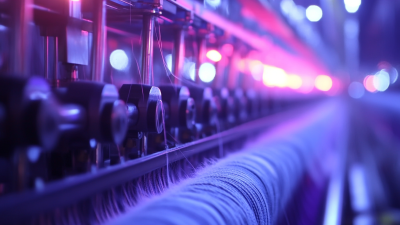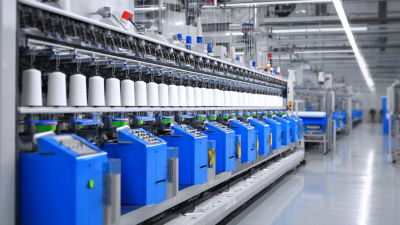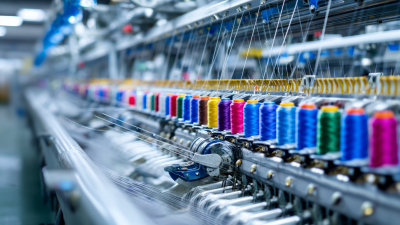Leave Your Message
The advancement of yarn production technology is on the brink of a transformative leap, primarily driven by innovations in the Ring Spinning Machine sector. According to the latest report from the Textile Machinery Manufacturers Association, the global demand for high-efficiency spinning machines is expected to increase by 7% annually, highlighting the pivotal role that Ring Spinning Machines will play in this growth.
With advancements such as automation, IoT integration, and energy efficiency, these machines are set to redefine production standards, reducing operational costs by up to 30%. Industry experts predict that by 2025, the adoption of smart Ring Spinning Machines will not only enhance the quality of yarn produced but also support sustainable production practices, aligning with the global push toward environmentally friendly manufacturing.

This blog will delve into the future of yarn production, emphasizing how advanced Ring Spinning Machine technology is shaping the industry landscape.
The yarn production industry is witnessing a significant transformation with the advent of advanced ring spinning machine technology. These innovative machines not only enhance production efficiency but also improve yarn quality, making them crucial for manufacturers aiming to stay competitive. Recent studies indicate that the incorporation of advanced ring spinning machines can boost productivity by up to 25%, significantly reducing labor costs and operational time. This leap in efficiency paves the way for higher output while maintaining the integrity of the yarn.
One of the standout benefits of these advanced machines is their ability to produce finer yarns with greater consistency. According to a report by the Textile World Journal, using state-of-the-art technology, manufacturers have achieved yarn diameters as fine as 7 microns without compromising strength. This precision opens up new avenues for fabric design and functionality, meeting the increasing demand for lightweight, high-performance textiles.
The future of yarn production is poised for transformation with the advancements in ring spinning technology, which focus on enhancing efficiency and automation. According to market predictions, the global spinning machinery market size is set to flourish, expected to grow from USD 5.89 billion in 2024 to USD 9.78 billion by 2034. This growth reflects the increasing demand for efficient spinning solutions that incorporate groundbreaking innovations in machinery, particularly those that enhance automation and process integration.
Recent developments emphasize optimizing key variables within drawing frames to improve the quality of polyester spun yarn. Innovative approaches, including soft computing techniques, have shown promising results in maximizing production efficiency and yarn performance. Leading manufacturers are leveraging these insights, aligning with trends observed at pivotal industry events where remote access and better controls have emerged as fundamental to modern spinning operations. As the sector embraces these technological advancements, manufacturers are positioned to provide enhanced value and sustainability, fundamentally reshaping yarn production for the better.
In recent years, the textile industry has witnessed significant advancements, particularly in ring spinning technology. Traditional ring spinning methods have long been the standard, characterized by their simplicity and reliability. Yet, the emergence of advanced ring spinning machines has transformed yarn production. These modern machines utilize better mechanics and automation, resulting in higher efficiency and improved yarn quality. By minimizing energy consumption and maximizing output, advanced technology has become a game-changer for manufacturers.
Tips: Consider investing in training for operators on new machinery to fully leverage the benefits of advanced spinning technologies. This not only enhances productivity but also promotes a culture of innovation within the workplace.
When comparing traditional and advanced ring spinning methods, efficiency is a key factor. Traditional methods often involve lengthy setup times and consistent maintenance, whereas advanced machines boast quicker changeovers and less downtime. Furthermore, the enhanced precision of advanced machines reduces waste, leading to a more sustainable production process.
Tips: Regularly review and compare machine performance data to identify any bottlenecks in production. This data-driven approach will help in making informed decisions for future investments in technology.
The increasing focus on sustainability in yarn production is driving the adoption of advanced spinning technologies that minimize environmental impact while maximizing efficiency. New ring spinning machines are at the forefront of this transformation, utilizing innovative designs that consume less energy and reduce waste during the manufacturing process. These machines are engineered to operate at higher speeds with improved precision, which not only enhances the quality of the yarn produced but also contributes to significant energy savings—a crucial factor in an era where resource conservation is paramount.
Moreover, the integration of eco-friendly materials and processes in yarn production is set to reshape the industry landscape. Advanced spinning technologies can facilitate the use of organic fibers and recycled materials, turning potential waste into valuable products. By harnessing these new technologies, manufacturers can produce yarn in a way that aligns with sustainable practices, fostering a cycle of innovation that reflects a growing commitment to environmental stewardship.
As consumers increasingly demand sustainable options, the evolution of yarn production will likely hinge on the continued advancement of these spinning technologies.
The textile industry is on the brink of transformation, thanks to advancements in ring spinning machine technology. As manufacturers adopt these innovative machines, we can expect a significant increase in productivity and efficiency. The integration of smart technology into ring spinning will enable real-time monitoring and data analysis, allowing producers to streamline their operations. This shift not only minimizes waste but also enhances the quality of the yarn produced, aligning with sustainability goals increasingly prioritized by the industry.
Moreover, the future of yarn production is marked by customization and flexibility. Advanced ring spinning machines will allow for a variety of yarn types and textures to be produced in smaller batches without sacrificing speed or quality. This capability will enable textile companies to respond more rapidly to changing consumer demands and trends. As brands seek to differentiate themselves in a crowded market, the ability to offer unique, high-quality yarn is set to become a key competitive advantage, paving the way for a more dynamic and responsive textile landscape.
| Trend | Description | Impact on Textile Industry |
|---|---|---|
| Automation and AI Integration | Increased use of automation and AI technologies to optimize yarn production processes. | Enhanced efficiency and reduced labor costs. |
| Sustainability Practices | Adoption of eco-friendly practices and materials in yarn production. | Improved brand image and compliance with regulations. |
| Customization and Flexibility | Development of machines that allow for customized yarn production. | Increased customer satisfaction and market competitiveness. |
| Digital Textile Technologies | Integration of digital technologies to enhance yarn design and production. | Faster time to market and innovative product offerings. |
| Smart Monitoring Systems | Implementation of IoT devices for real-time monitoring of production. | Reduced downtime and better quality control. |






